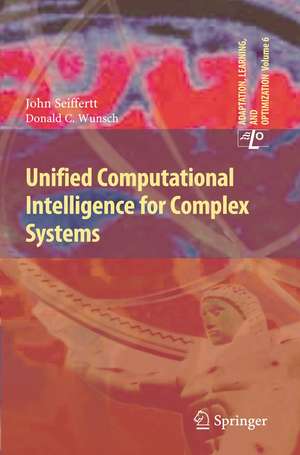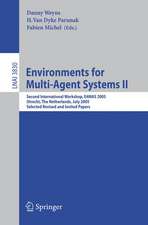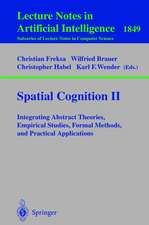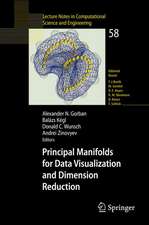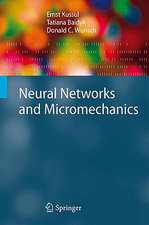Unified Computational Intelligence for Complex Systems: Adaptation, Learning, and Optimization, cartea 6
Autor John Seiffertt, Donald C. Wunschen Limba Engleză Paperback – 5 sep 2012
| Toate formatele și edițiile | Preț | Express |
|---|---|---|
| Paperback (1) | 637.23 lei 6-8 săpt. | |
| Springer Berlin, Heidelberg – 5 sep 2012 | 637.23 lei 6-8 săpt. | |
| Hardback (1) | 641.87 lei 6-8 săpt. | |
| Springer Berlin, Heidelberg – iul 2010 | 641.87 lei 6-8 săpt. |
Din seria Adaptation, Learning, and Optimization
- 15%
 Preț: 641.71 lei
Preț: 641.71 lei - 15%
 Preț: 634.32 lei
Preț: 634.32 lei - 20%
 Preț: 983.85 lei
Preț: 983.85 lei - 20%
 Preț: 648.44 lei
Preț: 648.44 lei - 20%
 Preț: 2196.22 lei
Preț: 2196.22 lei - 20%
 Preț: 984.18 lei
Preț: 984.18 lei - 20%
 Preț: 985.35 lei
Preț: 985.35 lei - 20%
 Preț: 653.38 lei
Preț: 653.38 lei - 20%
 Preț: 648.59 lei
Preț: 648.59 lei - 15%
 Preț: 640.37 lei
Preț: 640.37 lei - 20%
 Preț: 649.43 lei
Preț: 649.43 lei - 20%
 Preț: 651.42 lei
Preț: 651.42 lei - 18%
 Preț: 1837.57 lei
Preț: 1837.57 lei - 20%
 Preț: 646.62 lei
Preț: 646.62 lei - 20%
 Preț: 927.45 lei
Preț: 927.45 lei - 20%
 Preț: 651.75 lei
Preț: 651.75 lei - 20%
 Preț: 646.47 lei
Preț: 646.47 lei - 20%
 Preț: 986.66 lei
Preț: 986.66 lei - 20%
 Preț: 638.55 lei
Preț: 638.55 lei - 20%
 Preț: 983.39 lei
Preț: 983.39 lei - 20%
 Preț: 991.14 lei
Preț: 991.14 lei - 15%
 Preț: 638.57 lei
Preț: 638.57 lei - 15%
 Preț: 640.88 lei
Preț: 640.88 lei - 20%
 Preț: 1449.13 lei
Preț: 1449.13 lei - 20%
 Preț: 1284.47 lei
Preț: 1284.47 lei - 20%
 Preț: 985.35 lei
Preț: 985.35 lei
Preț: 637.23 lei
Preț vechi: 796.54 lei
-20% Nou
Puncte Express: 956
Preț estimativ în valută:
121.94€ • 127.57$ • 101.29£
121.94€ • 127.57$ • 101.29£
Carte tipărită la comandă
Livrare economică 03-17 aprilie
Preluare comenzi: 021 569.72.76
Specificații
ISBN-13: 9783642263958
ISBN-10: 364226395X
Pagini: 128
Ilustrații: 150 p. 9 illus. in color.
Dimensiuni: 155 x 235 x 7 mm
Greutate: 0.19 kg
Ediția:2010
Editura: Springer Berlin, Heidelberg
Colecția Springer
Seria Adaptation, Learning, and Optimization
Locul publicării:Berlin, Heidelberg, Germany
ISBN-10: 364226395X
Pagini: 128
Ilustrații: 150 p. 9 illus. in color.
Dimensiuni: 155 x 235 x 7 mm
Greutate: 0.19 kg
Ediția:2010
Editura: Springer Berlin, Heidelberg
Colecția Springer
Seria Adaptation, Learning, and Optimization
Locul publicării:Berlin, Heidelberg, Germany
Public țintă
ResearchCuprins
The Unified Art Architecture.- An Application of Unified Computational Intelligence.- The Time Scales Calculus.- Approximate Dynamic Programming on Time Scales.- Backpropagation on Time Scales.- Unified Computational Intelligence in Social Science.
Textul de pe ultima copertă
Computational intelligence encompasses a wide variety of techniques that allow computation to learn, to adapt, and to seek. That is, they may be designed to learn information without explicit programming regarding the nature of the content to be retained, they may be imbued with the functionality to adapt to maintain their course within a complex and unpredictably changing environment, and they may help us seek out truths about our own dynamics and lives through their inclusion in complex system modeling. These capabilities place our ability to compute in a category apart from our ability to erect suspension bridges, although both are products of technological advancement and reflect an increased understanding of our world. In this book, we show how to unify aspects of learning and adaptation within the computational intelligence framework. While a number of algorithms exist that fall under the umbrella of computational intelligence, with new ones added every year, all of them focus on the capabilities of learning, adapting, and helping us seek. So, the term unified computational intelligence relates not to the individual algorithms but to the underlying goals driving them. This book focuses on the computational intelligence areas of neural networks and dynamic programming, showing how to unify aspects of these areas to create new, more powerful, computational intelligence architectures to apply to new problem domains.
Caracteristici
First book presenting a computational intelligence architecture capable of learning in unsupervised, supervised, or reinforcement learning modes The only book covering applications of time scales mathematics to engineering applications The only book which ties these learning paradigms into all three levels of intelligence and provides applications to engineering, markets, and society
